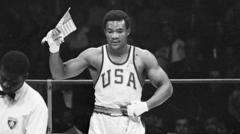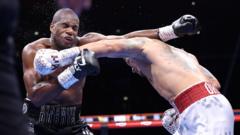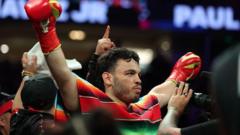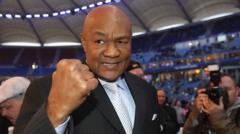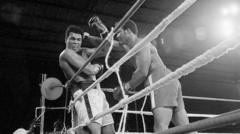George Edward Foreman, an iconic figure in the realm of sports and beyond, has left an indelible mark on history following his recent passing at the age of 76. Born on January 10, 1949, in Marshall, Texas, Foreman made his mark as a heavyweight boxing champion, known affectionately as "Big George." His illustrious career spanned decades, beginning in the 1960s, during which he amassed numerous accolades, including an Olympic gold medal and the world heavyweight title on two occasions.
Foreman's journey began with a stellar amateur boxing career, culminating in a gold medal at the 1968 Olympic Games in Mexico City. The moment he celebrated with a small US flag beautifully encapsulated his pride and identity, as he later recounted, "I was letting everyone know who I was and at the same time saying that I was proud to be an American."
Turning professional in 1969, Foreman rapidly ascended the boxing ranks, achieving a remarkable 37-fight winning streak by 1972. His ascent included an impressive victory over the previously undefeated Joe Frazier, which propelled him into the spotlight of the heavyweight championship.
However, his encounter with Muhammad Ali in the 1974 bout, famously nicknamed the "Rumble in the Jungle," would mark a turning point in his life. Despite his prowess, Foreman lost the championship title, an experience he labeled as the "most embarrassing moment" in his life. This defeat prompted a profound personal transformation; after losing to Jimmy Young in 1977, he turned away from boxing to embrace religion, becoming an ordained minister in 1978. Foreman reflected that this loss became “the best thing that ever happened to me,” as it allowed him to spread his message through his ministry.
Foreman’s hiatus from boxing lasted nearly ten years before he returned to the ring in 1987. His comeback was driven by a desire to fund his community youth center, leading him to capture the heavyweight championship again at the age of 45 in 1994, a record-setting achievement. Alongside his boxing successes, he also ventured into entrepreneurship, gaining fame as the pitchman for the George Foreman Grill, famously known as the "Lean Mean Grilling Machine."
Throughout his life, Foreman embodied family values and dedication, being a proud father to 12 children, five of whom share his name. He maintained an active role in his ministry, preaching regularly until his passing, a testament to his commitment to both faith and community.
George Foreman's legacy extends far beyond his boxing titles; it encompasses his journey of self-discovery, redemption, and unwavering dedication to improving the lives of others. As fans and family remember the man who transformed the narrative of modern athletes, Foreman’s life story embodies resilience, compassion, and an enduring impact on both sports and society.
Foreman's journey began with a stellar amateur boxing career, culminating in a gold medal at the 1968 Olympic Games in Mexico City. The moment he celebrated with a small US flag beautifully encapsulated his pride and identity, as he later recounted, "I was letting everyone know who I was and at the same time saying that I was proud to be an American."
Turning professional in 1969, Foreman rapidly ascended the boxing ranks, achieving a remarkable 37-fight winning streak by 1972. His ascent included an impressive victory over the previously undefeated Joe Frazier, which propelled him into the spotlight of the heavyweight championship.
However, his encounter with Muhammad Ali in the 1974 bout, famously nicknamed the "Rumble in the Jungle," would mark a turning point in his life. Despite his prowess, Foreman lost the championship title, an experience he labeled as the "most embarrassing moment" in his life. This defeat prompted a profound personal transformation; after losing to Jimmy Young in 1977, he turned away from boxing to embrace religion, becoming an ordained minister in 1978. Foreman reflected that this loss became “the best thing that ever happened to me,” as it allowed him to spread his message through his ministry.
Foreman’s hiatus from boxing lasted nearly ten years before he returned to the ring in 1987. His comeback was driven by a desire to fund his community youth center, leading him to capture the heavyweight championship again at the age of 45 in 1994, a record-setting achievement. Alongside his boxing successes, he also ventured into entrepreneurship, gaining fame as the pitchman for the George Foreman Grill, famously known as the "Lean Mean Grilling Machine."
Throughout his life, Foreman embodied family values and dedication, being a proud father to 12 children, five of whom share his name. He maintained an active role in his ministry, preaching regularly until his passing, a testament to his commitment to both faith and community.
George Foreman's legacy extends far beyond his boxing titles; it encompasses his journey of self-discovery, redemption, and unwavering dedication to improving the lives of others. As fans and family remember the man who transformed the narrative of modern athletes, Foreman’s life story embodies resilience, compassion, and an enduring impact on both sports and society.

